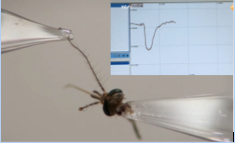Description
Material provided: Physical access for end-users
Unit definition: 1 week of access
Location: Wageningen University (WU), Wageningen, Netherlands
Biosafety Level: CL3
Installation name: CL3 Insectary
Website: WU BSL3 lab
The facility
The CL3 laboratory at WU offers the opportunity to perform infection experiments in cell culture and in mosquitoes with genetically modified (GMO) CL3 viral pathogens. Climate cabinets are available that can be programmed, including fluctuating temperatures. The cell culture lab keeps numerous mosquito cell lines, including Culex tarsalis, C. quinquefasciatus, Ae. albopictus and Ae. aegypti (Aag2), together with several mammalian cell lines to amplify different arboviruses (Vero, BHK21J, HEK293). Technical support can be made available to assist in the planned experiments. Recently, we have completed vector competence assessments with various European lines of Culex pipiens and West Nile virus (WNV) at a range of different temperatures (Fros et al., 2015 PloS NTD), as well as comparative vector competence studies with Usutu virus (Fros et al., 2015 One Health). The ability to infect mosquitoes with genetically modified, CL3 pathogenic viruses allows detailed studies on the molecular determinants of vector competence.
Available vectors
Experiments will be conducted with Infravec2-distributed mosquito vector colonies.
The insectaries at WU currently supply several lines of Culex pipiens (biotypes pipiens and molestus), Anopheles coluzzii, Anopheles quadriannulatus, Aedes aegypti, as well as Culicoides nubeculosus (biting midge). Users’ own mosquito colony/strain of interest might be hosted in the lab for the duration of the experiment, upon specific agreement.
Services offered
One Unit is a 1-week access to a dedicated CL3 lab to undertake pathogen infection studies on mosquitoes
The unit of access offers the rearing of the mosquitoes necessary for the experiments prior to the arrival of the user and preparation of virus stock. Experimental infection and subsequent analysis will be realised by the user with help from a technician and supervision by a researcher for completion of the assays when necessary.
Equipment
- Biological Safety Cabinet
- Olfactometer
- Blood-feeding unit (Hemotek) for oral virus infections
- Micro-injector (Nanoject) for intra-thoracic virus infections
- Three climate controlled cabinets
- -80 Freezer
- Mosquito-proof tent for injection and dissection studies
- Set-up for electrophysiological analysis
- Phase-contrast microscope
For more information, please contact us.

